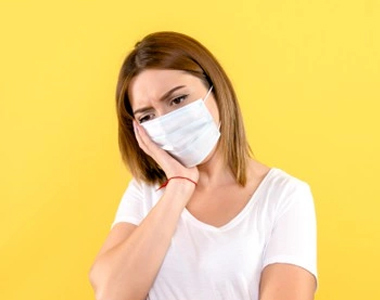Written by- Jessica Arnold
Posted on October 30, 2020
If you’ve been feeling a little on edge lately, you’re not alone. According to a report released by Harvard Medical School and the University of North Carolina, the COVID-19 pandemic has increased stress levels in the U.S. by 55%! Elevated stress levels can lead to many overall health problems, including issues affecting your oral health. And the current public health crisis is highlighting how lifestyle stressors can impact health and well-being. New data from the American Dental Association Health Policy Institute’s (HPI) COVID-19 impact poll reports that dentists have seen a rise in stress-related oral health conditions in their patients since the onset of the COVID-19 pandemic.
More than half of the dentists polled reported an increase in teeth grinding (bruxism), chipped and cracked teeth, and disorders affecting the jaw muscles (temporomandibular symptoms). Over a quarter of these same dentists saw a rise in conditions like cavities and gum disease.
Stress affects your smile
It’s not uncommon for people under a lot of tension to begin grinding their teeth as a response to stress. Clenching the jaw or holding the teeth too tightly together during the day or while sleeping can cause jaw pain, earaches, headaches, and worn down teeth.
Increased stress can also take a toll on your immune system. Evidence suggests that a compromised immune system makes it easier for infections to develop and fester. It means the infections in the mouth, like canker or cold sores, can take longer to heal.
Stress can also lead to bad oral health habits like smoking, drinking, and neglecting a normal hygiene routine, including regular brushing, flossing, and visiting the dentist.
Preventive oral care remains down
HPI survey showed that 99% of dental offices in the U.S. are open. Patient volume leveled off at just over 80% of pre-COVID-19 levels, indicating patients have not fully resumed the usual preventive care and treatment schedules. It is troubling news because it affects adults and children alike.
Ways to reduce stress-related oral health problems
It’s not possible to make the pandemic or the stress associated with it disappear overnight, but you can take steps to make your family’s oral health a priority and reduce stress-related oral health problems.
- If you find yourself clenching your jaw during the day, take a few moments to relax your face and jaw muscles and let your teeth part. If you’re a night-grinder, talk with your dentist about solutions, like a mouthguard.
- Build up your body’s immune system by getting enough rest and eating healthy foods full of vitamins and minerals.
- Brush and floss regularly. Keeping up a good oral hygiene habit at home is the number one way to prevent gum disease and tooth decay.
- Visit the dentist. Dental offices are open and taking extra measures to keep you and your family safe. It could include pre-appointment screenings, temperature checks, extra cleaning and sanitation measures, and additional personal protective equipment for patients and staff.
Be sure to make time for some of your favorite ways to relax, like reading a book or going for a bike ride. It is also a great opportunity to try something new! Making healthy choices will help keep your physical and mental health in tip-top shape.
http://deltadentalazblog.com/covid-19-stress-linked-to-increased-oral-health-problems/
Related



 Review Us
Review Us Review Us
Review Us